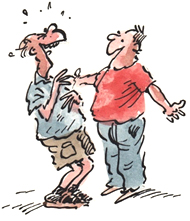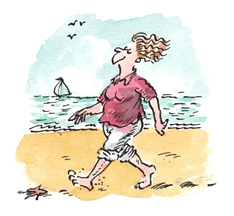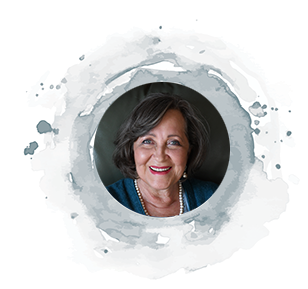CLICK LINKS BELOW TO VIEW ARTICLES:
MINDFUL RETIREMENT - Exploring the Psychology
MINDFUL RETIREMENT - Out to pasture or a vibrant encore?
RETIREMENT READINESS - Is your parachute in order?
MOTIVATION - The lion or the lighthouse, which do you prefer?
WHAT MAKES YOU TICK? - Understanding our basic human needs
RETIREMENT STRESS - Not a walk on the beach
RETIREMENT STRESS - Daily hassles , beware of the little foxes
COPING WITH STRESS - Uplifts and how to create them


NOT A WALK ON THE BEACH!?
- by Dr Hannetjie
Hallo again,
Retirement stress can be an unexpected pitfall and wreck one’s dreams of beautiful beach walks and endless days of bliss. In the following sections Dr Hannetjie will discuss various aspects of stress, and how to prepare ourselves in order to safely sidestep them.
(Original cartoon by Bill Stott, from Over the {Hill} Moon)
What is Stress?
Basically, stress is the non-specific response of the body to any demand or perceived threat.
Any situation that requires us to respond, even a positive one that you have chosen, requires the body to adapt. Now, this is the important thing to remember about stress. Emotions are not abstract, disembodied feelings - they possess chemical and physical components. When you feel a rush of emotion in a stressful situation, (such as fear, rage, anxiety, or happiness), chemicals, minerals and electrical impulses undergo changes in your body. All actions and emotions are funded by chemicals in your body. All these chemicals need to be replaced regularly. So, the harder you work and the more stress you have, the more nutrients your body will require just to keep functioning.
If the extra nutrients are not supplied and body stores are not replenished, bodily systems cannot keep functioning. Systems and break down progressively, leading to illness and eventually, death.
When your eating, drinking, sleeping and exercising habits are sound, your health is protected to a certain extent and you will possess a higher degree of stress tolerance. (We will deal with nutrition in a separate article in due course.) See the mitigating factors on the Holmes and Rahe Stress measurement scale below.
Here are some of the terms used in the context of Stress that you may, or may not, already be familiar with.
It may be worth your while to reflect on these terms and find their equivalent situations in your life, so you can arm yourself accordingly.
• Stress - pressure or tension exerted on a system, need to adjust
• Stressor - a specific problem, challenge
• Stress Reaction - response to a stressor
• Strain - exhaustion, deformity or injury induced by excessive stress
• Eustress = good stress – opportunity or success
• Distress = bad stress –disappointment or failure
• Catastrophic events
• Major life events
• Chronic circumstances
• Daily hassles (More about the last two items in an upcoming article post – Beware the Small Foxes)
Without stress you may as well be dead!
We need stress, but not too much as to overwhelm our bodies and exhaust our reserves.
How do I know how stressed I am?
Way back in 1967, two psychiatrists, Thomas Holmes and Richard Rahe proposed that life stressors affected health in a big way, and that one could expect a vulnerability in your health to flare up if you had been exposed to certain events in the previous three years. They surveyed over 5000 patients and found confirmation for their hypothesis. The more events the patients added up, and the higher their scores on the stress scale and the more likely they were to become ill.
A few of the high-score items on the list are stopping work, spouse stopping work, changes in living conditions, changes of residence, changes in number of arguments, revision of personal habits, change in financial state, divorce and death in the family. So many of these items coincide with retirement. Small wonder then that it is so unexpectedly stressful.
One’s stress score can be exacerbated by circumstances such as, family history of death before age 65, not sleeping or eating well, failure to meet goals, addictive habits and poor financial- or family support.
But, here is the good news!
By being well-prepared for changing circumstances and by having a positive attitude and lifestyle, many of the negative effects of stress could be contained.
A sense of humour was one of the great mitigators!
Our motto is again vindicated – proper planning prevents panic, and stress!
(Original cartoon by Bill Stott, from Over the {Hill} Moon)
Some of the other mitigating circumstances are a great family history of longevity, a good diet, goal achievement, good preparation for most foreseeable eventualities and a satisfying personal and financial life, amongst others.
Download your Holmes and Rahe stress scale with exacerbating and mitigating assessments from https://vdocuments.site/holmes-rahe-stress-scale-exercise.html
If your scores are in the danger zone, take action immediately to protect yourself as best you can.
Advice for Financial planners and their clients:
In his article cited below, Robert Laura, one of the contributors to the Forbes column on retirement, asks and answers that very question – Why is retirement so stressful?
He says:
I hate to be the bearer of bad news, but retirement doesn’t always turn out the way people think. Primarily because this stage of life can intersect with an avalanche of activity that causes a massive amount of stress, worry and anxiety. As a result, people can often suffer in silence as they try to figure out what’s going on.
He explains The Holmes and Rahe Scale Stress Scale and then goes on to say: This research is a major reason why traditional retirement planning needs to be revamped to include more non-financial training and knowledge.
He recommends that we forget the notion that retirement is a walk on the beach - we should strengthen ourselves by planning ahead and … financial advisors “should be teaching people about resilience and positive psychology instead of just asset allocation and stock market returns.”
Read his full article at
https://www.forbes.com/sites/robertlaura/2018/05/24/why-is-retirement-so-stressful/amp/
Our team recommends:
When you have experienced a major stressor, such as death, divorce, retirement or another big change, voluntary or not, do not make any drastic moves or decisions for at least a year thereafter. Take stock of where you are, be kind to yourself and muster every bit of support that you can get until you feel that your situation has stabilised.
Of course, plan your next move carefully and discuss your plans with people who know you well and whom you trust to give you sound advice. Avoid taking on any new commitments for quite some time and take time for R&R.
Do join a mindfulness group and learn to meditate – these are well-tested and tried stress-coping mechanisms.
You will find more information and tips from Dr Hannetjie on her Pinterest pages
• Positive living and ageing -
https://za.pinterest.com/hannetjie777/positive-living-and-ageing/
• Mindful retirement –
https://za.pinterest.com/hannetjie777/mindful-retirement/
• Hypnosis, Mindfulness and Meditation –
https://za.pinterest.com/hannetjie777/hypnosis-mindfulness-and-medi
Remember to stay calm and breathe!
Blessings,
Dr Hannetjie
Ok. We retired, we travelled, we did 110 things you should do before you die. What now?
(Original cartoon by Bill Stott, from Over the {Hill} Moon)



INFORMATION TO BE USED AT YOUR OWN RISK.
Any suggestions or opinions voiced in these pages are those of the authors, and in no way to be constructed as final treatment advice. They are intended as a starting point to develop your own preparation and treatment plan. Please consult your medical and/or psychological experts or caregivers to fine-tune the advice and suggestions for your own unique needs.






